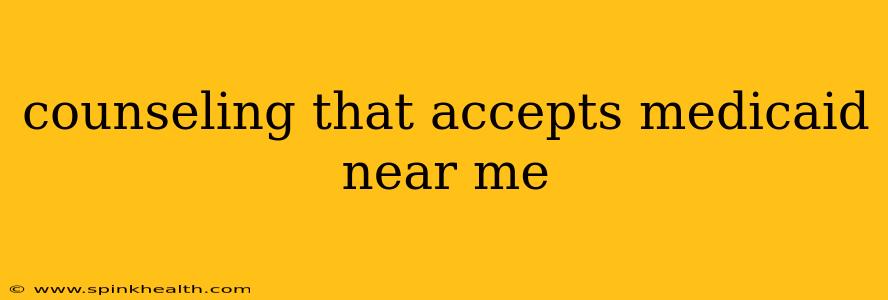Finding Affordable Mental Healthcare: Navigating Medicaid Counseling Options Near You
The journey to better mental well-being can feel daunting, especially when financial concerns add to the stress. Finding affordable counseling is crucial, and if you’re covered by Medicaid, accessing the right care shouldn't be a hurdle. This guide will help you navigate the process of finding Medicaid-accepting counselors near your location.
Let's start with my own story. Years ago, I found myself struggling with anxiety. The thought of therapy felt overwhelming, not just emotionally, but financially too. Thankfully, I discovered the resources available through Medicaid, and it was a game-changer. This experience fueled my desire to help others navigate this sometimes confusing system.
How to Find Medicaid-Accepting Counselors Near Me?
The first step in your search is understanding your specific Medicaid plan. Different states administer Medicaid differently, and the specific providers in your network will vary.
1. Check your Medicaid provider's website: Your state's Medicaid agency website is your best starting point. These websites usually have provider search tools. Simply enter your location and specify "mental health services" or "counseling." You can often further refine your search by specifying the type of therapy you're looking for (e.g., Cognitive Behavioral Therapy, individual therapy, family therapy).
2. Use online directories: Several online directories specialize in listing mental health professionals. Some of these directories allow you to filter your search by insurance, including Medicaid. Be sure to verify the information on these directories with the provider directly, as listings can sometimes be outdated.
3. Contact your primary care physician (PCP): Your PCP is a valuable resource. They often have relationships with local mental health professionals and can provide referrals to counselors who accept Medicaid.
4. Reach out to local community mental health centers: These centers often offer low-cost or free mental health services, including counseling. They frequently accept Medicaid. Searching online for "[your city/county] community mental health center" will likely yield relevant results.
What Types of Counseling Are Covered by Medicaid?
Medicaid coverage for mental health services varies by state, but generally includes:
- Individual therapy: One-on-one sessions with a therapist.
- Group therapy: Therapy sessions involving multiple individuals.
- Family therapy: Therapy involving family members.
- Medication management (in some cases): While not always direct counseling, some Medicaid plans may cover medication management by a psychiatrist or other qualified healthcare provider.
It's crucial to verify your specific plan's coverage to avoid unexpected bills.
What if I Need a Specific Type of Therapist (e.g., specializing in trauma)?
Finding a specialist who accepts Medicaid might require a bit more effort. You can still use the methods described above, but be sure to clearly state your specific needs during your search. Many online directories allow for specifying therapist specializations. Don't hesitate to call the offices of potential therapists directly to inquire about their Medicaid acceptance and area of expertise.
What are the limitations of using Medicaid for mental healthcare?
While Medicaid significantly expands access to affordable mental healthcare, limitations do exist.
- Network restrictions: You might be limited to counselors within your Medicaid plan's network.
- Waiting lists: Demand for mental health services can sometimes lead to waiting lists.
- Coverage limits: Some Medicaid plans may have limitations on the number of therapy sessions covered.
What are my options if I don't find a Medicaid-accepting counselor?
If your search proves difficult, explore these options:
- Sliding scale fees: Some therapists offer sliding scale fees based on income, potentially making their services more affordable.
- Non-profit organizations: Non-profit organizations often offer reduced-fee or free mental health services.
- State or local government assistance programs: Some areas have additional programs to support access to mental health services.
Finding affordable, quality mental healthcare is essential. By utilizing the resources available and being persistent, you can find the support you need to improve your mental well-being. Remember, seeking help is a sign of strength, and you deserve access to the care you need.

